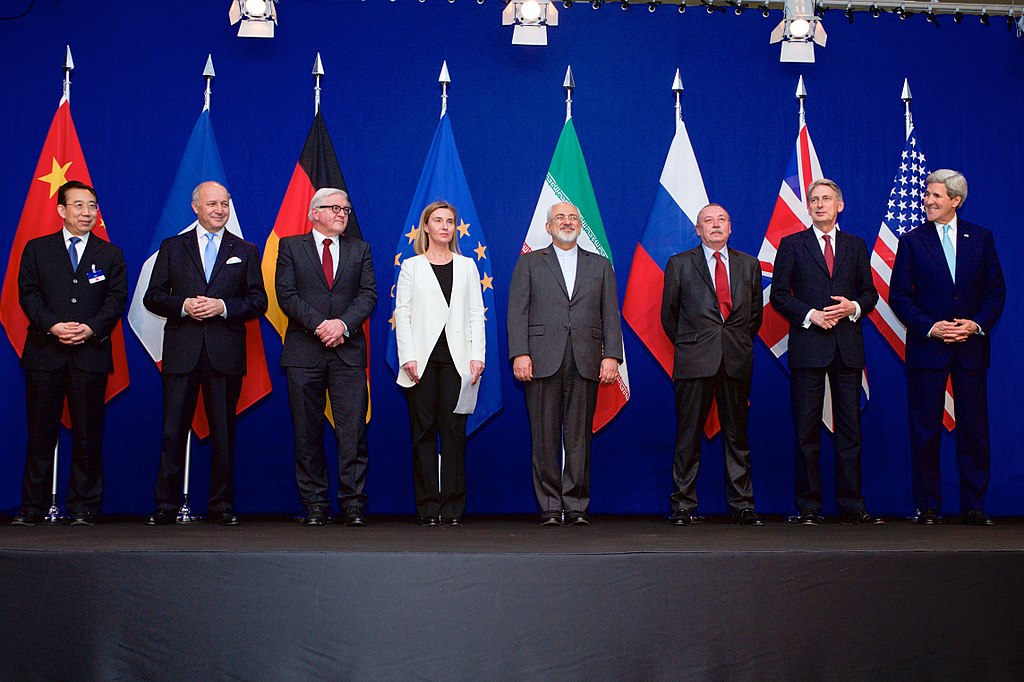How U.S. Sanctions Affect Europe’s Leverage in the Iran Deal Dispute Resolution Mechanism
The reapplication of U.S. secondary sanctions measures following the American withdrawal from the Iran nuclear deal has been at the heart of current challenges facing the nuclear deal.

Published by The Lawfare Institute
in Cooperation With

The American withdrawal from the Joint Comprehensive Plan of Action (JCPOA) in May 2018 has not prevented Washington from influencing the future of the agreement. Quite the opposite. The impact of U.S. sanctions measures reimposed after the U.S.’s withdrawal from the deal has been key to the current dispute between Iran and the European parties to the JCPOA as it has frustrated European efforts to provide Iran with the economic benefits Tehran expected to receive under the deal. U.S. sanctions are also bound to have an important influence on the dispute resolution mechanism (DRM) process triggered by the U.K., Germany and France (the E3) in January.
Unlike earlier attempts—including in December 2019—to resolve disagreements over the deal through the JCPOA’s Joint Commission, the body set up by the agreement to monitor its implementation, the DRM process is technically time bound. It also establishes a possible pathway to reimposition of the EU and U.N. sanctions that had been lifted under the JCPOA, should parties fail to resolve the dispute. While negotiations can be extended by consensus, endless extension of the DRM without significant progress on resolving issues is unsustainable. Such extensions risk being taken advantage of by Iran to expand its prohibited nuclear activities or to run out the clock on its conventional arms embargo, due to expire this October under the terms of the JCPOA. Credible sanctions “snapback” is important to encourage meaningful progress on the resolution of the dispute within the DRM process.
U.S. unilateral sanctions on Iran have severely blunted the potential impact of a U.N. and EU sanctions snapback on the Iranian economy, denying the Europeans critical leverage in the negotiations. Since its withdrawal from the nuclear deal, the U.S. has not only reimposed its pre-JCPOA sanctions provisions on Iran but also implemented a series of additional measures blocking the U.S. financial sector from dealing with Iranian banks and forcing foreign financial institutions and businesses to decide between transacting with Iran and maintaining access to the U.S. financial system. The result has been a serious chilling effect on the willingness of businesses around the world to engage in economic activity with Iran, despite the fact that U.N., EU and other sanctions lifted following the conclusion of the JCPOA have not been reinstated. Reimposed EU and U.N. sanctions therefore would be largely redundant, formalizing restrictions on activities that most businesses already avoid out of fear of finding themselves on the wrong side of the U.S. sanctions regime. This is particularly the case since U.N. and EU pre-JCPOA sanctions on Iran were narrower in scope than current U.S. sanctions.
Not all reapplied U.N. and EU sanctions would be without practical impact for Iran. For instance, U.N. and EU sanctions snapback may preclude international assistance on certain civilian nuclear cooperation projects with Iran, including the modernization of the Arak heavy water reactor. The possible suspension of U.S. waivers meant to shield companies engaging in those cooperation projects from U.S. sanctions, however, would have similar effects— regardless of whether U.N. sanctions are reimposed.
Another potential impact of a U.N. sanctions snapback is its effect on continued Russian and Chinese trade with Tehran. . The reapplication of U.N. sanctions on certain Iranian banks and renewed calls for member states to exercise caution when transacting with Iranian financial institutions generally may complicate and disincentivize this trade. The same may be true of European and Chinese exports of machinery and electrical equipment to Iran. These exports are key to the Iranian manufacturing sector and have continued despite U.S. secondary sanctions, although at greatly reduced levels. U.N. and EU sanctions snapback may complicate such trade and discourage businesses and financial institutions from engaging in it.
The reimposition of U.N. sanctions would also permit countries to inspect vessels or aircraft suspected of carrying cargo in violation of U.N. sanctions provisions on Iran in national or international waters. U.S. sanctions alone cannot provide such authority outside U.S. waters. Under U.N. sanctions, each country would be able to decide if and how it chooses to use this new authority. The international applicability of such a provision, however, may give countries greater scope to pressure other jurisdictions to stop and inspect Iranian ships and aircraft, or those of third countries, suspected of violating those sanctions on Iran.
Additionally, reimposed U.N. sanctions would preclude lifting the conventional arms embargo on Iran set to expire in October. Conventional arms trade with Iran is likely to be less susceptible to U.S. sanctions than trade in other sectors due to the government-to-government nature of such trade. Countries that decide to sell weapons systems to Iran would risk damaging their relations with the U.S. or becoming the subjects of U.S. sanctions themselves. Jurisdictions that already face U.S. sanctions—or expect their arms sales to Tehran to be lucrative enough to outweigh such risks—may, however, look to capitalize on the lifting of the embargo. Russia and China, for instance, have already expressed opposition to any extension of the embargo and may decide to take advantage of the new market for their weapons exports. Nevertheless, the list of prospective arms suppliers to Iran would likely be short.
Besides some exceptions, reimposed U.N. and EU sanctions on Iran would nevertheless be largely symbolic, with limited—although not entirely superficial—practical implications for the Iranian economy. Such symbolism has a weight of its own. Being placed under U.N. sanctions inflicts reputational damage on the country in question, often making businesses and governments more reticent to engage with it—regardless of whether transactions violate any sanctions. Iran, in particular, has stressed the importance it places on being treated with dignity and as an equal player on the international stage. Thus it will have reason to try and avoid the snapback of sanctions even in light of their limited economic impact. However, an overreliance on threats of the reimposition of sanctions is unlikely to prove useful in inspiring Iran to cooperate in the DRM process. Instead of lending the E3 the necessary leverage, threats of sanctions snapback simply for the sake of sanctions snapback are likely to damage any Iranian goodwill in the deliberations and be counterproductive in convincing Tehran that it is being treated with respect and as an equal party in the agreement and the DRM process.
Under the current circumstances, the Europeans may have far more to lose from threatening the snapback of largely redundant sanctions than they have to gain. This may be particularly true if Iran carries through its threats of a withdrawal from the Nuclear Non-Proliferation Treaty in the case of U.N sanctions reimposition. Instead of focusing on sanctions snapback, the issue of critical importance will be the ability of the E3—and potentially Russia and China—to take advantage of the time afforded by the DRM process to engage with the U.S. on the sidelines. The source of the current dispute lies largely in Washington, as does its most likely resolution, whatever shape that resolution may ultimately take. If meaningful progress is to be made within the framework of the DRM process on resolving the current impasse and limiting Iranian nuclear activities, Washington will have to offer some incentives to make up for the leverage lost as a result of its unilateral sanctions on Iran. Determining what those incentives might be will require some creative negotiation of its own, and taking a hard look at the unilateral U.S. sanctions regime on Iran may be a good place to start.





